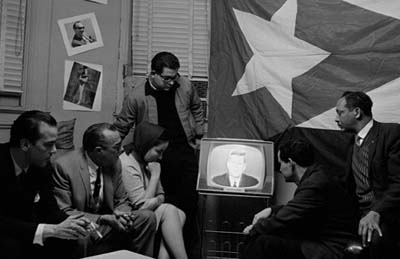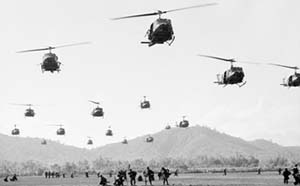 |
 |
| current issue |  | past issues |  | send a letter/news |  | address update |  | advertise |  | about us |  | alumni home |
Features
Wage Peace, Not WarPage: < Prev 1 2 3 4 Next >
Lang has been involved in Blight's critical oral history work from its inception, fitting it in around her own career in epidemiology. A colleague praises her "intense practicality and energy," but cancer has greatly compromised that energy. "I need a lot of naps," she admits. She finally gave up her career because of the profound fatigue, but she continues her partnership with Blight: "I can do a little when I feel good, and I never have to worry about leaving anyone in the lurch because Jim always picks up the slack."
"They are the most interesting people I've ever met," says David Welch, CIGI Chair of Global Security at the Balsillie School of International Affairs. They are also adventurous. After many years at Brown University--and after Lang finished a rigorous 23 weeks of chemotherapy in Boston--they packed their bags and moved to Canada this January to join Welch at the Balsillie School in Waterloo, Ontario, Canada.
 BRINK OF DISASTER: A group of Cuban refugees in Manhattan watch President John F. Kennedy deliver a speech on television on Oct. 22, 1962, during the Cuban Missile Crisis. In a conference organized in the 1990s by Blight and Lang, it came out for the first time that Cuba had tactical nuclear weapons. |
Blight's only interest in studying the past is to understand what went wrong and how to avoid it in the future. It's a mission he shared with McNamara, who died last summer at age 93. Both acutely believed a nuclear holocaust is a frighteningly real possibility.
In fact, Blight's fear that President Ronald Reagan might push the button was the reason he began taking security studies classes at Harvard's Kennedy School of Government in the early 1980s. At the time, he was a fellow in Harvard's history of science department and Lang was studying for her doctorate in epidemiology.
Blight chose to focus on the 1962 Cuban Missile Crisis, even though most historians believed there was nothing new to learn. But Blight thought perhaps the right questions had not yet been asked of the right people in the right way.
"We want to know what it was like to be in that situation...What were they afraid of, and what is that like? These questions are rock-bottom for us," says Lang.
"Most historians don't think about this stuff very much because they are into the narrative," says Blight. But he was a student of William James, a 19th-century psychologist and philosopher who believed that "...the recesses of feeling... are the only places in the world in which we catch real fact in the making, and directly perceive how events happen, and how work is actually done."

|
The challenge was how to get at those feelings, especially decades after the fact. "Jim had this idea of setting up constructive conflict between former decision-makers, documents and scholars. It was a totally brilliant idea," says Welch.
The first critical oral history conference in 1987 brought together aging members of President Kennedy's inner circle, including McNamara, to discuss those tense October days 25 years earlier when the world came dangerously close to nuclear war in a face-off over Soviet missiles in Cuba. "It was fascinating," recalls Welch. The group learned how frightened--or unfrightened, in some cases--the Kennedy administration had been. "We also realized we needed to know what the other side was feeling."
So over the next 15 years, Blight and Lang organized five more missile-crisis conferences in Havana, Moscow and Antigua. They also organized two critical oral history conferences on the Bay of Pigs invasion, five on the collapse of U.S.-Soviet detente, six on the Vietnam War and, most recently, two on U.S.-Iran relations.
Page: < Prev 1 2 3 4 Next >Easy to print version

